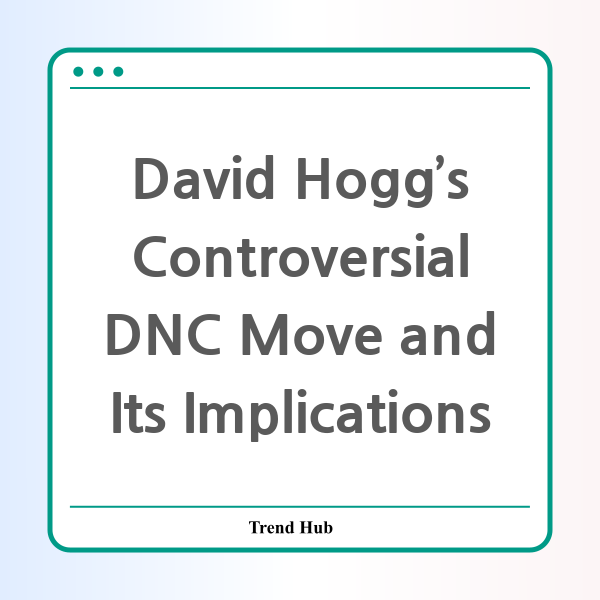* This website participates in the Amazon Affiliate Program and earns from qualifying purchases.

What happens when a young activist is thrust into one of the most powerful positions in the Democratic Party? David Hogg, known for his activism after surviving the tragic mass shooting at Marjory Stoneman Douglas High School in 2018, has recently stepped into a controversial role as Vice Chair of the Democratic National Committee (DNC). Just weeks into this role, he is already facing backlash for leveraging DNC resources for his own political action committee, “Leaders We Deserve.”
Hogg’s approach raises important questions about ethics in political fundraising and the responsibilities of party leaders. According to reports, he has utilized DNC contact lists to solicit donations for his PAC, from which he reportedly earns over $100,000 annually. This strategy has not only raised eyebrows but also ignited fierce criticism among party insiders who feel that such actions undermine the DNC’s integrity.
When Hogg sent out texts to the DNC’s contact list, he encouraged recipients to support his PAC with the message: "David Hogg here: I was just elected DNC Vice Chair! This is a huge win for our movement to make the Democratic Party more reflective of our base: youthful, energetic, and ready to win.” While this initiative may resonate with some younger voters, it has left many party members reconsidering their support.
The financial implications of Hogg’s PAC are significant. Since its inception in August 2023, he has accumulated more than $175,000, with a notable $20,000 in salary payments recorded just in December 2023. Such compensation practices have drawn ire from party veterans, claiming that focusing on personal fundraising at the expense of party unity is detrimental to the DNC’s mission and overall health.
Several party members have voiced their concerns, highlighting the ethical dilemmas presented by Hogg's fundraising tactics. One senior official remarked, "It’s especially important for all Democratic national officials to focus on raising support for the party and not using their position to raise money for themselves or their personal political PACs." This sentiment underscores a growing fear that individuals like Hogg lack the accountability needed in leadership roles, particularly at a time when the party is in dire need of cohesion and strong guidance.
Critics also point out Hogg’s relative inexperience in a political landscape that demands a nuanced understanding of both party dynamics and voter expectations. With a history of unapologetic far-left stances, his rapid ascent to a position of influence raises alarms among established party operatives who question whether this shift aligns with the overall values of a diverse Democratic base.
As the DNC continues to grapple with internal conflicts and public perception, Hogg’s role serves as a litmus test for generational change within the party. While the infusion of youthful energy might be refreshing, it also prompts a critical examination of priorities and strategies moving forward.
In conclusion, while Hogg's intentions may stem from a desire to inspire a new generation of leaders within the Democratic Party, the execution of his role thus far has created a rift that may have long-term consequences. The implications of personal PAC usage at the expense of party cohesiveness must be thoughtfully addressed as the DNC enters a tumultuous political cycle ahead.
* This website participates in the Amazon Affiliate Program and earns from qualifying purchases.